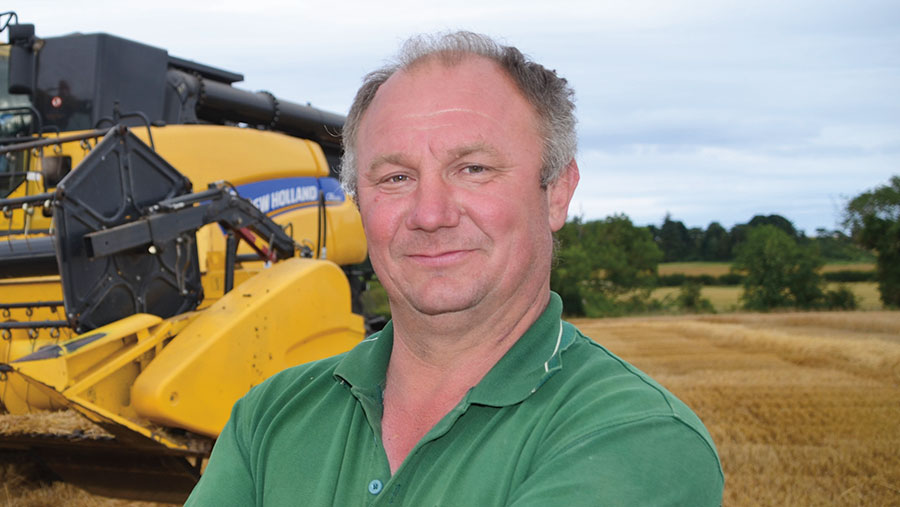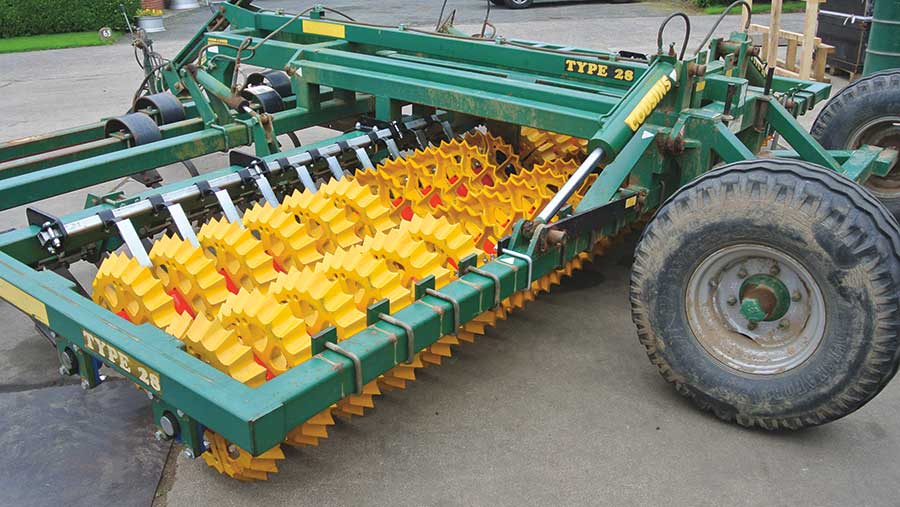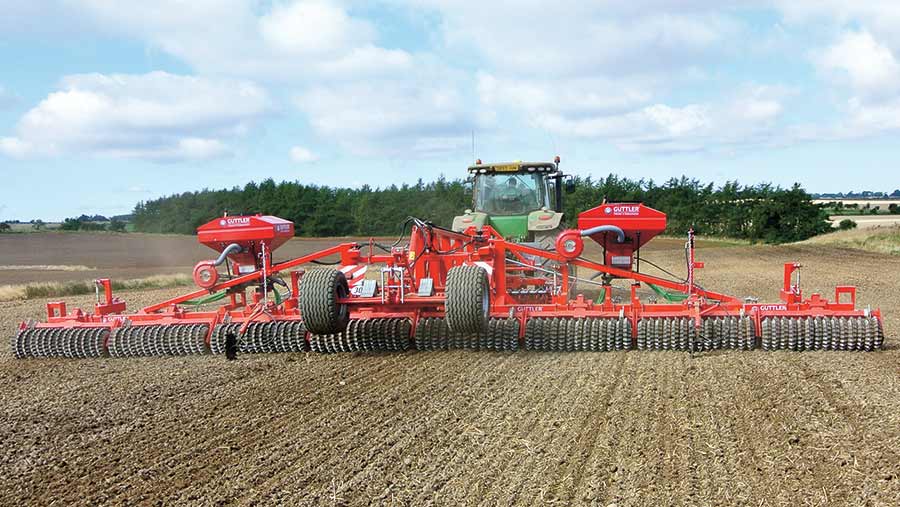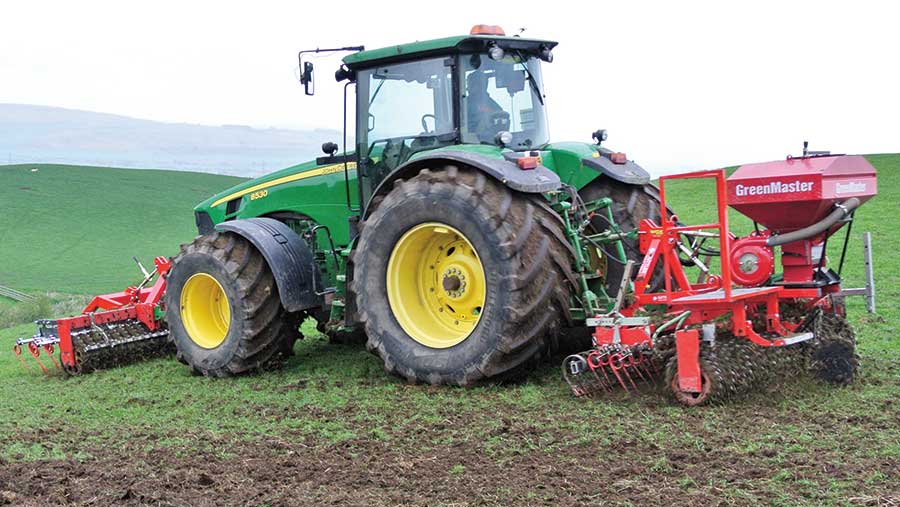How new packer rollers extend farmer’s drilling window
Packer rollers and presses may be one of the more mundane components of any cultivation fleet, but they are often a key element in making seedbed preparation a success – or a failure.
It makes sense, therefore, to take a bit of time when choosing a new tillage tool or replacing worn metal in that department.
For Northumberland farmer and contractor Pip Robson, there is only one choice of packer or press for the wildly varying soil types across his own land and that of his customers.
“For years, like most farmers, I had just accepted whatever roller came on the back of a machine. If it didn’t do a very good job or you couldn’t travel in the wet, you just put up with it and parked up until conditions improved,” he explains.

Pip Robson is convinced changing the rollers on virtually every piece of soil-engaging kit has been worthwhile © Nick Fone
“But our working windows in this part of the world are tight and we are always trying to cover more acres with fewer machines so the reality is that we need to be able to work when things are less than ideal.”
See also: Core principles of successful late drilling to beat blackgrass
Retro-fitting rollers
To try to tackle this issue, 10 years ago Mr Robson made the decision to start retro-fitting German-made Guttler serrated Prisma rollers to his kit. First up was a 5m folding Kuhn power-harrow.
“I had had a Guttler front press for a couple of years and was pleased with the job the rings did in breaking up clods and producing a level, consolidated seedbed,” says Mr Robson.
“When I bought the Kuhn second-hand it came with Flexicoil spiral rollers, which didn’t even touch our lightest land and on the heavy stuff would immediately block up.

Both the 5m Kuhn power-harrow (pictured) and 6m Moduliner combi-drill are fitted with Guttler rings as packers
“If we were going to make it work, it was going to need something better in the consolidation department. I contacted Guttler importer Wox Agri Services near Morpeth and they supplied two 2.5m roller sections for about £6,000 that could be bolted straight in.
“Instantly it was transformed – the power-harrow produced a firm, even finish and we could travel in the wet.”
Those first retro-fitted rings were plastic versions, which proved a real success in reducing the overall weight of the mounted combination and, thanks to an butter-smooth non-stick surface, avoided picking up sticky soil even more effectively than the steel variants.
Guttler Greenmaster
Three years later, when looking at the options for a quicker way of establishing grass leys, Mr Robson revisited Wox and bought a 3m Guttler Greenmaster.
The combination cultivator came with sprung levelling paddles, heavy grass harrow tines and 45/50cm diameter self-cleaning Prisma rings running back-to-back.
Perched on top was a hopper with a hydraulically driven fan and outlets blowing seed down in front of the roller rings.
“I liked the concept of scratching a tilth and rolling the seed in one pass. But the key difference with the Guttler was the aggressive action of the roller.
It didn’t just whack down the surface but provided a sideways consolidation effect ensuring seed-to-soil contact.”
It was those qualities that saw him fit Guttlers on his Cousins Type 28 tine and press combination the following year.
“The Razor rings were absolutely shot, having done thousands of acres of work. The shoulders were worn through and we were constantly having to weld them up.
I priced up replacement Cousins rings but the retro-fitted double Prisma rollers worked out cheaper,” he says.

Pip Robson opted to swap the worn-out rings on his Cousins Type 28 tine/press combination for serrated Guttler Prismas
“The bearing carriers were exactly the same size so we just undid the old ones and bolted the Guttlers straight in without drilling a hole.
Just by chance the original scrapers fitted between the rings, so with a bit of repositioning we were able to run them, too. Since then it hasn’t been touched.”
Improving consolidation
Aggressive interlocking dragon-tooth rollers produce a thorough consolidation with regularly spaced pock-marks to aid drainage and avoid capping.
That makes for a weatherproof finish if there is a delay between cultivation and drilling – a frequent occurrence in north-east England.
The range in soil type means versatility is key in any tillage tackle employed by the business. The hollow nature of the Prisma rings means they don’t tend to accumulate soil but can trap small stones.
“It can cope with a wide range of soil conditions – wet or dry. If they have a weakness it’s picking up fist-sized rocks but it’s hardly a drama – you just back up a bit and they tend to drop out.
Of course that’s only an issue with the wide-spaced interlocking rings on the double presses – there’s never a hitch with the back-to-back single-packers.”
So convinced was Mr Robson, when he bought his next drill the order went in specifying that it should be supplied without any form of packer. Instead he ordered two 3m Guttler rollers that were bolted straight in on arrival.
“We run two drills – a 4m Vaderstad Rapid and a 6m trailed Kuhn Moduliner power-harrow combi.
The Rapid is brilliant for covering the acres at pace in the dry but we are rarely guaranteed a clear run and inevitably have to resort to the combination drill when the weather turns against us.
“But often with power-harrows it’s the packer or press roller that bungs up first in wet conditions.
With the Guttlers we can keep travelling much longer than normal and it has a much better action on the soil, consolidating to a reasonable depth without causing surface compaction and capping.”
Keeping them clean
With alternating 45cm and 50cm diameter rings running back-to-back, the retro-fit packers tend to have a fairly effective self-cleaning action without the need for scrapers.
And it’s the same principle with the 12.3m Guttler Magnum rollers that Mr Robson bought in 2014.
They are kitted out with rake tines and travel at up to 12kph to scratch stubbles and generate a weed chit behind the combine, as well as their primary role as a seedbed consolidation tool.
Kitted out with twin air-seeders, the rolls are also used to apply slug pellets and sow grass seed.
In addition, in the battle against grass weeds, they are used to spread Avadex and go out on hire to neighbouring farms specifically for this purpose.

The 12.3m Magnum rollers are used to apply slug pellets, establish new grass leys and spread granular herbicide © Nick Fone
Once again it’s their surface action for which they gain most credit. That said, thanks to their self-cleaning action, their ability to travel longer in the season than standard Cambridge rolls means their £42,000 purchase price is easily justified in Mr Robson’s eyes.
“We have spent thousands on fitting Guttler presses and packers to our cultivation kit, as well as buying the 3m and 12m Greenmaster roller-seeders, and I’m convinced the investment is worth it,” he concludes.
“I’m planning that shortly we will have a subsoiler fitted with Prisma packer and when the rings wear out on our Vaderstad Top Down, that will definitely get them, too.”
Business facts
Messrs PA Robson, near Alnwick, Northumberland
Farmed area 890ha plus 405ha contract combining
Cropping Winter wheat 35%, OSR 20%, winter barley 20%, beans and peas 15%, spring oats 10%
Contracting work Stubble-to-stubble arable work, grassland care, baling, groundworks and drainage
Stock 70 pedigree Angus suckler cows
Machinery
- Tractors – John Deere 8530, 7230-R, 7530, 6930, 6155-R
- Loaders – JCB TM270, Bray PS4000C shovel and Caterpillar TH407
- Combines – 2 x NH CR9080s with 9m (30ft) headers
- Sprayer – trailed JD 740i
- Diggers – 13t and 2.5t Komatsu PC130 JCB 8027
- Drills – 4m Vaderstad Rapid and 6m Kuhn Moduliner power-harrow combination
- Staff – Pip Robson plus three others full-time employees and casuals as required


